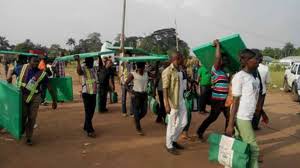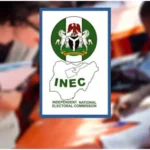Seven states have been identified as potential hotspots of violence ahead of Saturday’s rescheduled governorship and state assembly elections.
Following the pre-election violence occasioned by clashes between supporters of the major political parties in the seven states, fear has enveloped residents.
People in the states say they are gripped by fear given the wave of clashes between supporters of the main contenders and political parties, especially in the build-up and aftermath of the February 25 presidential and National Assembly polls.
The states, according to reports and analyses by this paper, included Kaduna, Zamfara, Lagos, Kano, Gombe, Rivers and Bauchi. Calls are being made by stakeholders to the security agencies to strengthen the security apparatus in the states ahead of the elections.
Gov’ship polls: Emir urges politicians to be tolerant, patient
Ogun gov’ship: I’m the gov, I can arrest anybody – Abiodun
Kano
In Kano, residents say they are afraid of witnessing a repeat of what happened in some LGAs during the February 25 presidential and National Assembly elections, as well as the violence that broke out during and after the 2019 gubernatorial elections in the state.
The fears have been heightened by allegations and counter-allegations of alleged plans to foment trouble by leading political parties in the state.
The state police command has equally confirmed security intelligence that some “disgruntled” politicians have perfected plans to import thugs into the state to disrupt the elections.
A cross-section of residents recalls incidents of violence reported during the campaign period, as well as clashes between supporters of the two leading parties (APC and NNPP) a day before the presidential election in Kano city.
They said the arson and killings reported in Takai and Tudunwada local governments during the presidential and National Assembly elections were already strong harbingers of what to expect during the governorship election.
Lagos
Another state that is on the radar is Lagos. There is tension across the state ahead of Saturday’s governorship election, as many residents say they are apprehensive over possible violence as thugs of the ruling APC slug it out with those of the opposition LP and PDP.
The defeat of the APC in the presidential election on February 25 has raised tension as the ruling party fights to retain the state it has ruled for more than 20 years.
Tension was heightened on Saturday when gunmen attacked the LP governorship candidate, Gbadebo Rhodes-Vivour in Epe.
The Lagos Police Command said it is implementing anti-crime strategies to tackle the tension in some areas regarded as “political hotspots” in the state following a series of threat messages on social media.
The state Commissioner of Police, Idowu Owohunwa, directed all area commanders and their respective Divisional Police Officers (DPOs) to personally visit the different polling units in their Areas of Responsibility (AOR), take count of the polling units, and note possible areas of threat toward tightening security in those areas during and after the elections.
Zamfara
Residents of Zamfara State have equally expressed fears of violence ahead of the polls, even as the candidates have been trading blame over attacks and counter-attacks largely perpetrated by their supporters.
The two major candidates are Governor Bello Mohammed Matawalle, who is seeking re-election on APC’s platform, and Alhaji Dauda Lawal Dare, the PDP governorship candidate.
Since the start of campaign activities, attacks on each of the candidates’ supporters, offices, campaign vehicles and billboards have been a recurrent phenomenon.
The opposition in the state has accused the state’s anti-thuggery agency of harassing and intimidating them, an allegation the agency has denied.
On the eve of the February 25 presidential election, the governorship candidate of PDP, Dr Dauda Lawal Dare, had alleged assassination attempt on his life after an attack on the motorcade of his wife by the operatives of the state’s anti-thuggery agency.
He said the convoy of his wife was coming back from party engagements in Gusau, the state capital when it was intercepted and attacked by the operatives of the government agency.
The fear of possible violence is also predicated on the fact that voters were said to have been unable to cast their ballots during the February 25 elections because they were threatened with abduction by terrorists.
Bauchi
In Bauchi State, there was a tense political atmosphere that resulted in violent clashes between supporters of the incumbent governor, Bala Mohammed of the PDP and the candidate of the main opposition party, APC, Air Marshal Sadique Baba Abubakar (rtd).
In the last month, the PDP and APC have been at each other’s throats over the clashes that led to the killing of three people and the injury of dozens of supporters during campaign rallies.
This development has heightened fears in the minds of many residents, who say their lives may not be secure during next Saturday’s governorship and state assembly polls.
Their fears are also hinged on the fact that all the frontline governorship candidates in Bauchi are conducting their campaigns with thugs masquerading as local hunters who display weapons during rallies to intimidate the opposition.
Sokoto
In Sokoto, there is palpable fear among the residents over the forthcoming governorship election in the state due to inciting utterances by some political leaders.
The political atmosphere in the state has been tense following the utterances, accusations and outright condemnation that greeted the presidential and National Assembly elections in the state.
Daily Trust reports that the elections were marred by violence, resulting in the cancellation of results from over 400 polling units, thus making it impossible for INEC to declare winners of the parliamentary elections in the state to date.
Candidates and their parties were said to have used political thugs to disrupt the election process at polling units where they perceived defeat because of the INEC guidelines, which allow for the cancellation of election in places where violence erupted.
There were also reported cases where thugs dispersed voters and destroyed ballot papers and boxes.
It is against the backdrop that residents say they are scared of coming out to freely participate in Saturday’s polls
Gombe
Residents of Gombe State are also worried over the threat of violence and heightened political thuggery being witnessed in some parts of the state.
Before the February 25 presidential and National Assembly elections, at least five people were injured when suspected thugs attacked the residence of a stalwart of the PDP, Alhaji Salisu Abdul’aziz.
Abdul’aziz was a member of the ruling APC before he defected to the PDP. He had convened the meeting for women and youths at his residence in Jekadafari area of Gombe metropolis when the suspected thugs invaded and dispersed the gathering.
How to avert violence – Expert, CSOs
A political analyst and lecturer at Bayero University Kano (BUK), Professor Kamilu Sani Fage, said violence is more pronounced in the gubernatorial and state House of Assembly elections because they are more local and the actors know the competition is fiercer.
On ways to avert the crisis, Fage said a major thing to be done is for the politicians to be cautious with their utterances and actions because “they are the ones with thugs and financing thuggery.”
“They hold it as a duty to the electorate and the country to know that where there is a crisis, they will not be able to govern.
“Also, the electoral umpire also has to take the issue seriously, wherever there is violence, such should be properly investigated, and whoever is found culpable should be punished according to the laws of the land,” he said.
On its part, the Transition Monitoring Group (TMG) said more orientation and appropriate sanctions for infractions are needed to avert electoral violence ahead of Saturday’s governorship and state assembly elections.
The TMG chairman, Auwal Musa Rafsanjani, said successful elections are characterised by high efficiency in their conduct by the elections management body, all relevant stakeholders and indeed the citizens.
“This is the major reason that there was the signing of two peace accords by all political parties and their candidates so that we have peaceful, non-violent 2023 elections.
“These peace accords were brokered by high-profile individuals in the country in the presence of all stakeholders, such as security agencies, CSOs, international and local election observation missions, and the media,” he said.
He said the government and all other stakeholders must ensure that politicians, their parties, and supporters are adequately warned against inducing violence during the elections.
“All thugs and gang groups must be marked and monitored by the security agencies as these are the people who the politicians recruit to perpetrate acts of violence,” Rafsanjani said.
A security and intelligence expert, Prof. Oyesoji Aremu, charged personnel of the Nigeria Police Force not to give undue or preferential treatment to any politician before, during and after the gubernatorial and state assembly elections.
Aremu, a professor of criminology at the University of Ibadan, said: “The police need to put up much stronger intelligence, which is part of their proactiveness.
“This time around, the intelligence network has to be properly deployed, so that you know what to deploy in an area.
“Also, I think the police need to, this time around, call the political gladiators in the states together.
“The idea of the peace accord signed in Abuja last time should be re-enacted in the states in such a way that politicians should be warned, by placing them on a watch list.”
The spokesman of the Nigeria Police Force, Olumuyiwa Adejobi, could not be reached for comment, as calls to his mobile phone went unanswered at the time of filing this report.
However, Adejobi had earlier told newsmen shortly after the Inspector-General of Police, Usman Baba. met 37 CPs across the 36 states and the FCT that they had been charged to be on red alert during the March 18 polls.
He specifically said the strategic police managers discussed and reviewed topical issues and strategies for a more secure electoral process, adding that all commissioners of police and strategic commanders posted for election duties have been directed to mobilize all resources at their disposal to defend the electorate.
By Fidelis Mac-Leva, Abbas Jimoh (Abuja), Clement A. Oloyede (Kano), Abdullateef Aliyu, Eugene Agha (Lagos), Hassan Ibrahim (Bauchi), Haruna Gimba (Gombe) & Shehu Umar (Gusau)

 Join Daily Trust WhatsApp Community For Quick Access To News and Happenings Around You.
Join Daily Trust WhatsApp Community For Quick Access To News and Happenings Around You.

